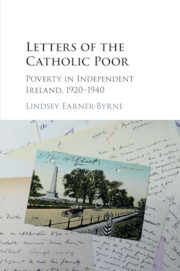Book contents
- Letters of the Catholic Poor
- Letters of the Catholic Poor
- Copyright page
- Dedication
- Contents
- Acknowledgements
- Abbreviations
- Editorial Rubric
- Introduction
- 1 The Social Setting
- 2 Artefacts of Poverty
- 3 The ‘Poor’ Make Their Case
- 4 Hidden Poverty
- 5 The Cost of Poverty
- 6 Vetting and Vouching
- Conclusion
- Bibliography
- Index
- References
Bibliography
Published online by Cambridge University Press: 20 January 2017
- Letters of the Catholic Poor
- Letters of the Catholic Poor
- Copyright page
- Dedication
- Contents
- Acknowledgements
- Abbreviations
- Editorial Rubric
- Introduction
- 1 The Social Setting
- 2 Artefacts of Poverty
- 3 The ‘Poor’ Make Their Case
- 4 Hidden Poverty
- 5 The Cost of Poverty
- 6 Vetting and Vouching
- Conclusion
- Bibliography
- Index
- References
- Type
- Chapter
- Information
- Letters of the Catholic PoorPoverty in Independent Ireland, 1920–1940, pp. 259 - 278Publisher: Cambridge University PressPrint publication year: 2017



